Tips for Everyone: How to Stay Organized - Articles | APU Ritsumeikan Asia Pacific University
Tips for Everyone: How to Stay Organized
Imagine this—classes have already begun, and so far, so good... you’ve attended the first class, read and understood the syllabus (hopefully), been getting a hang of the workload and constantly adding to your to-do list, taking some notes here and there, and trying to keep up with your readings. A few days go by without you even realizing, and suddenly, your professor assigns groupwork but you don’t know who your groupmates are, midterms are coming soon but you don’t know where to find the materials to study, or there’s a quiz you missed that you didn’t know had to be submitted before class started. If you’re finding yourself in these kinds of situations or simply want to avoid that possible stress, it’s not too late to create a system for yourself and secure a smooth and worry-free semester ahead.
TIP 1: Give your classes their own space
Let’s start with some helpful apps you can never go wrong with. I use Notion for almost everything. Think of it as an outline or the backbone that will be the basis on your road to organization. In Notion, I have pages for each of my classes, my class schedule, a grade calculator, a calendar, and a to-do list. For taking notes, I use an app on my iPad called GoodNotes to keep not only my notes but also the required readings for each class organized by folder. Once you’ve downloaded these apps or something similar... let the organization magic begin!
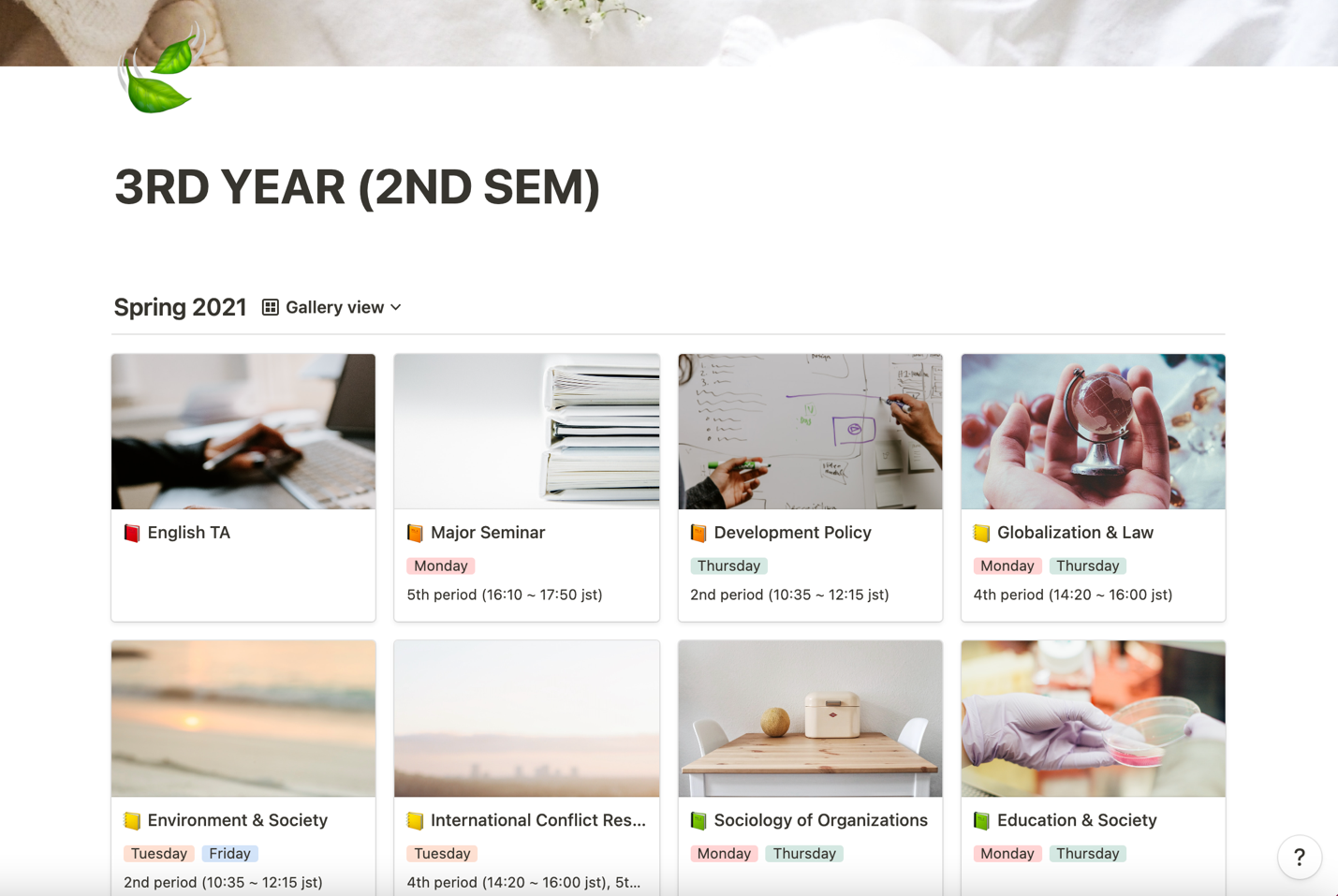
If people need their own space or “me time”, then so do your classes. You want to organize by assigning a page or a folder that’s just for them! Here’s a peak at how my classes look, all cute and snuggly in their own little boxes. With these designated spaces, it is now much easier to put all related information and materials together with each relevant class.
TIP 2: Gather information
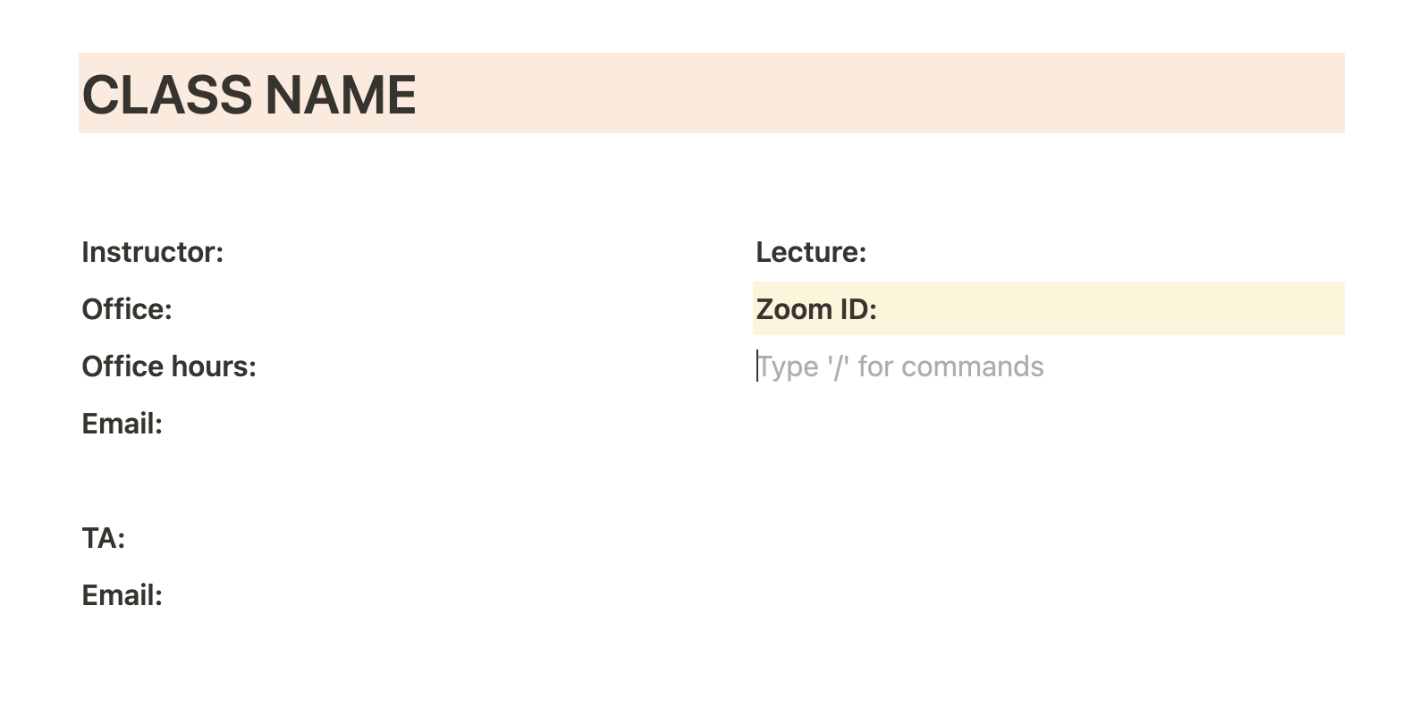
For this part, you’ll want to gather all the necessary information for each of your classes. This important information includes the term that your class will be held, the day and period to attend, whether the class is online or on campus, the meeting ID/classroom, and the professor’s name. Once you’ve gathered all this information, you can now put it into its respective class space. Life will be so much easier once all these details are in one place.
TIP 3: Know who to contact
You probably have that one person who you can call or run to when you’re in desperate need for help. The same applies to your classes, and it is important to know the right people to contact when you have a question or need clarification, when you’ll be late or absent, or when you need to catch up or understand a lecture better. This person or people could be your professor, the teaching assistant (TA), or your peers. Knowing where to find your professor’s office and knowing their office hours, as well as their and the TA’s email addresses is a must. That way, if the time ever comes when you’re feeling under the weather, you can immediately send your TA or professor an email. As for your peers, being connected on social media can also help you out in a moment of need!
TIP 3: Know who to contact
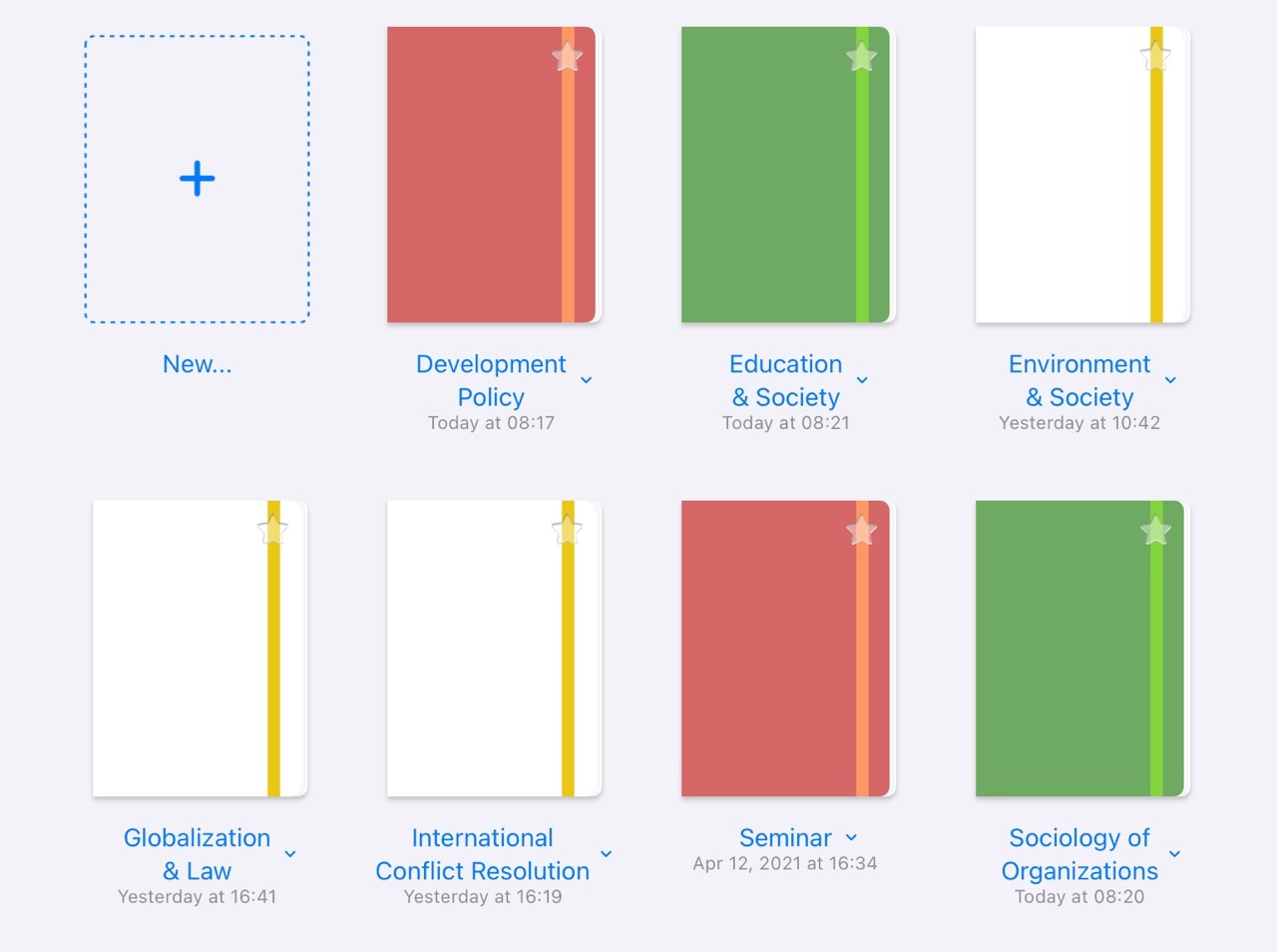
Notes, on the other hand, can get mixed up real quick. With wrong or no labels at all, it will be harder to find what you need, especially when you need it the most. As I mentioned earlier, I use GoodNotes to file all my notes. Some like to type their notes or simply copy paste them, but I personally recall more information if I’ve written it down. You might be wondering, why don’t I just have an old-fashioned notebook? I get attached to my notes and find it hard to throw them away, so I end up stashing them which takes up space and collects dust while I eventually forget about them. With digital notetaking, I not only get to store those files for as long as I want without taking up much space, but I also get to save the environment. In the end, it will really depend on your own preference, but what matters most is that your notes are all properly labelled and in one place. For me, I’ve chosen to organize by color (red for semester-based classes, white for my first quarter classes, and green for my second quarter classes.)
TIP 5: Establish your own grade tracking system
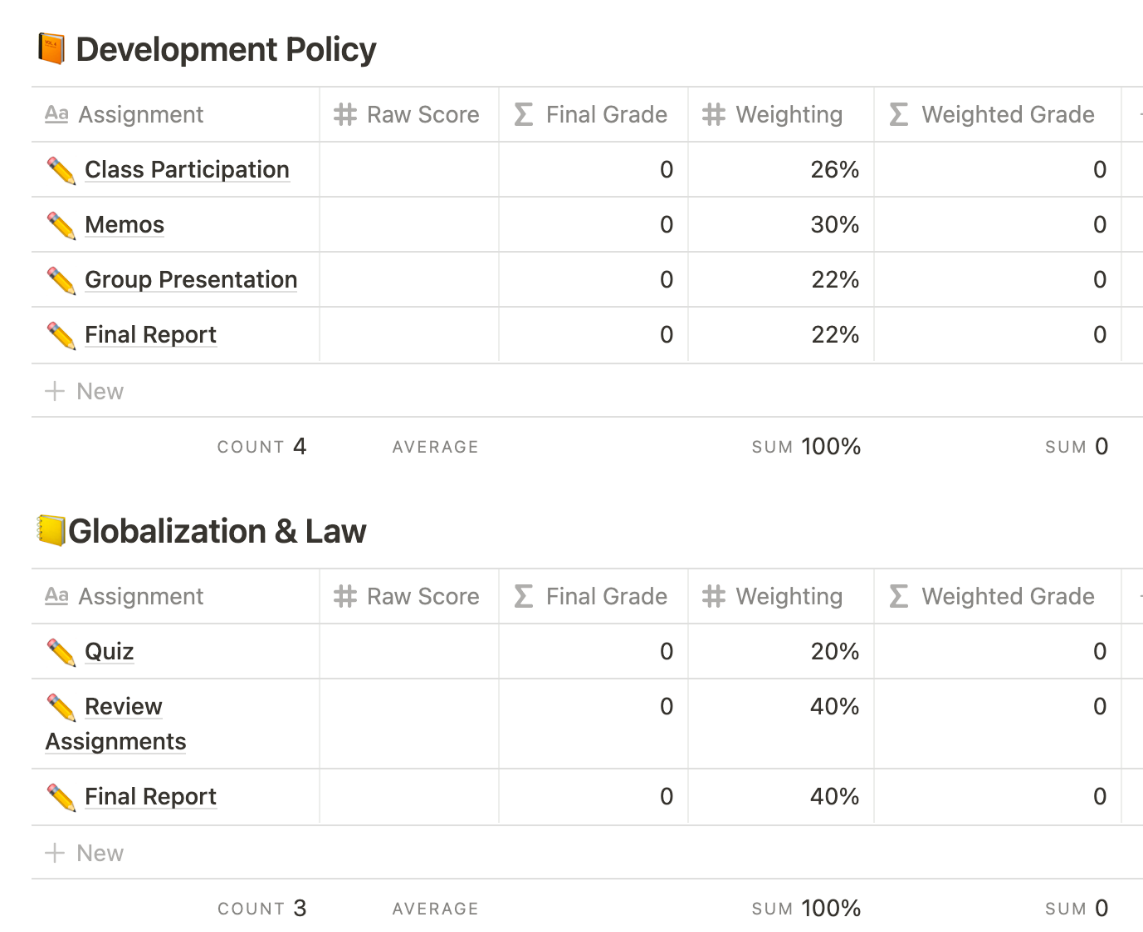
Another thing you might want to set up is a place for all your grades. This will come in handy towards the end of the semester when you’ll want to easily calculate and average what final grade you’ll be getting. Again, the syllabus will come in handy here, as it’s normally where you can find the breakdown for your professor’s grading. All you have to do is search for free Notion templates online and paste them into your Notion workspace. With these templates to help you track your grades, by the end of the semester, you’ll be able to estimate your final grade easily.
TIP 6: Keep track of your tasks with a calendar and to-do list
It’s a given that within a semester, you’ll have lots of deadlines, meetings, and exams coming full speed your way, and if these important dates and tasks are all over the place, you’re more likely to miss them. Not only should you note them down, but having a legend for each one is very important as well.
- Meetings
- Deadlines
- Class 1
- Exam
Your to-do list can be arranged in such a way that you can pinpoint which tasks haven’t been started, which are in progress, and which have been accomplished. Personally, I find it very convenient to have it all in one place within Notion.
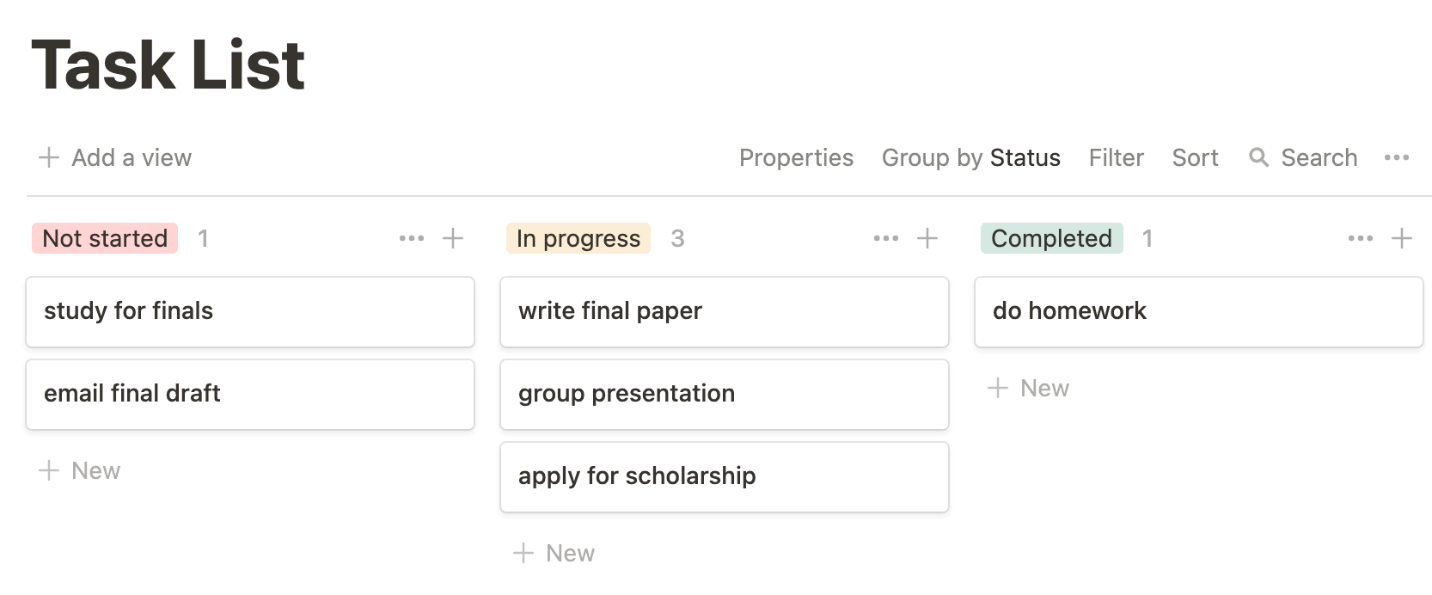
Hopefully that gave you some inspiration on how you might organize the rest of your semester. Remember that the organization process itself might seem tedious and a lot of work when you could just say YOLO and go with the flow, but TRUST ME—it’s all going to be worth it in the end. Forgot the Zoom ID for your next class? That’s alright! It’s here in the app. Not sure when you should start preparing for your final exam? Your calendars got you! Think your grade was miscalculated? Not to fear, you’ve got everything listed for a recalculation. There are many benefits that come with preparation, and just a little organization will give you an easy breezy, worry-free semester ahead. So, if you’re thinking of creating a better system of organization for yourself, remember my tips and... let the organization magic begin!
Gil
Gillian Montero Encarnacion (Gil) is an APS student from the Philippines, majoring in International Relations and Peace Studies and is also a member of the APU Social Media Unit. She spends her time taking photos, vlogging, and learning new languages such as Japanese, Spanish, French, and Chinese.